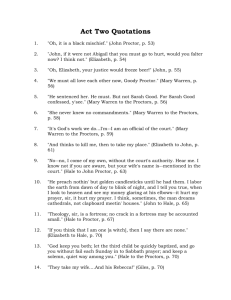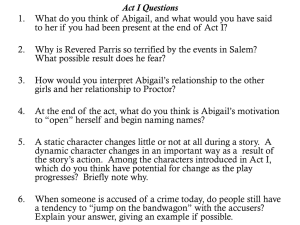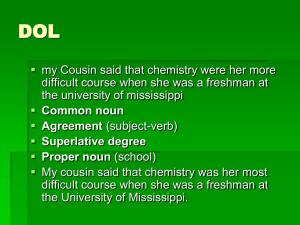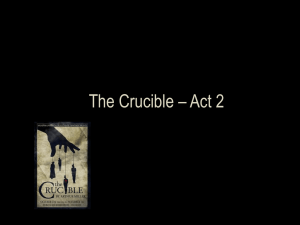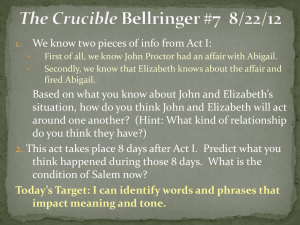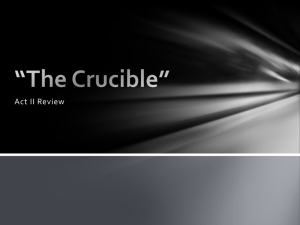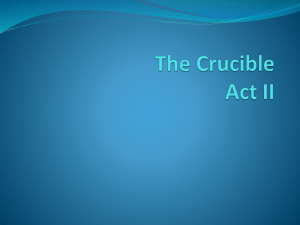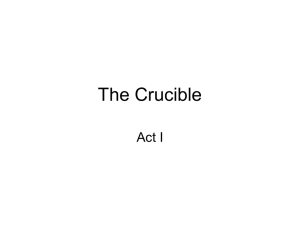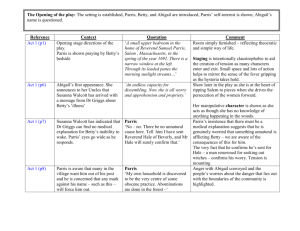Act II The Crucible
advertisement
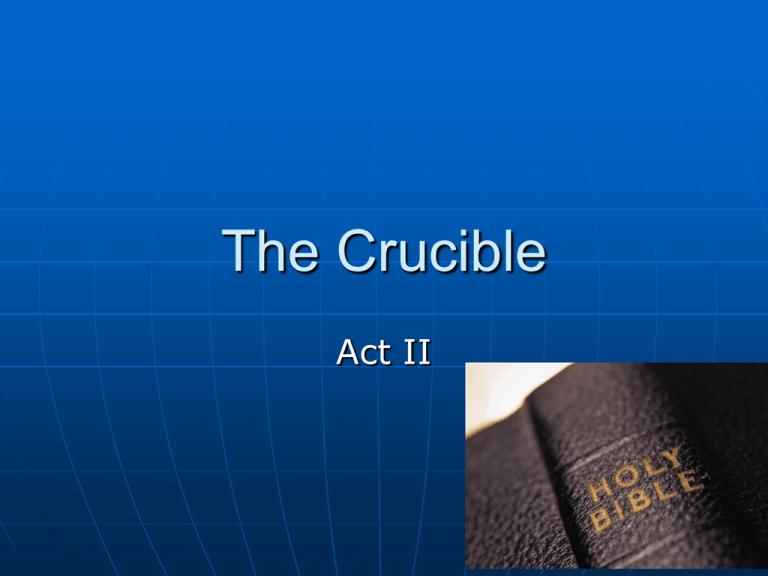
The Crucible Act II Setting How much time has passed between Act I and Act II? 8 days In the exposition of this act, what is the condition of the relationship between John and Elizabeth Proctor? They are very polite with each other and the relationship seems uncomfortable and strained. The awkward conversation between them eventually retards quickly into an argument. Allusion What does Elizabeth’s allusion to Moses’ parting of the Red Sea reveal about Abigail’s new standing in the community? The comparison between Abigail and Moses suggests that she has become a power in the community. The Israelites looked up to Moses because God spoke to him directly. Allusion In Proctor’s argument with Elizabeth, he alludes to a court, and compares Elizabeth to a judge. What is the effect of these allusions? We see that the Proctors have not resolved the anger resulting from John’s affair with Abigail; although he has confessed and repented, John still feels that Elizabeth judges him. Mary Warren Mary is physically weak when John Proctor confronts her about going to town after he expressly forbid it. Why is Mary in such shaky physical condition? She has been in court all day; she has probably heard people condemned and arrested. She probably feels guilty and frightened because of her lies. Characterization Mary Warren • Cowardly • Easily led by the other girls • Basically honest • Melodramatic • Does not handle pressure well Character Change What change has Mary’s participation in the court proceedings brought in her attitude toward the Proctors? Mary has acquired a sense of her own importance and will no longer accept being treated like a servant. Accusation Of whom is Elizabeth speaking when she says,” She wants me dead”? How do you know? She believes Abigail is the one who accused her. She knows that Abigail is jealous of her and wants to take her place. Hale’s Visit Why would Hale come to visit the Proctors without the court’s authority? What are his intentions? He may not agree with the court’s judgments so far. He may decide the time has come to rely on his own judgment. He may hope that he can help the Proctors. Elizabeth Why is Elizabeth horrified when she learns that Rebecca Nurse has been discussed? She knows that this is no laughing matter; she also knows Rebecca is in great danger. Everyone recognizes that Rebecca is truly a good person; Elizabeth realizes that if Rebecca isn’t safe, then no one is safe, including herself. Word Study Theology • theo – Greek word meaning “God” • “-logy” – suffix meaning “the science or study of” Allusion What do you know about the Puritans and their “plain style” that affects your interpretation of the golden candlesticks? The Puritans scorned material goods, especially in church; their churches were as plain as possible. An insistence on gold candlesticks was not appropriate for a Puritan. Proctor’s Attitude What does Proctor’s conversation with Hale reveal about his attitude toward Parris? Proctor believes that Parris does not belong in the clergy. He distrusts Parris’s fitness to give the sacraments. Irony What commandment does John leave out? Adultery Why is this ironic? This is the commandment he has broken. Irony Commandment – “Thou shalt not bear false witness.” The children and the other accusers are bearing false witness against the accused, but they are praised for it rather than condemned. Irony Proctor tells Hale about Abigail’s admission to him in Betty’s room. What is ironic about Proctor’s statement, “I have no witness and cannot prove it, except my word be taken”? The same is true of all the accusations; they are made on people’s unsupported word. Proctor is the only one who hesitates to accuse without witnesses, and yet he is the only one speaking the truth. Allusion Explain Francis’s allusion to the “bricks and mortar of the church.” It is a metaphor that compares Rebecca to the church building. The church is the house of God, and the bricks and mortar are both the walls and the substance that holds the walls together. Rebecca is a good and holy woman, and she is compared to the lasting bricks of the building. Drawing Conclusions What really happened to Abigail at dinner? Since Mary sewed the doll in court, Abigail probably saw her doing it. She probably saw Mary push the needle into the doll. She knew that the doll would be in the Proctor’s house with the needle in it. She stabbed herself with a needle to make her accusation match the “evidence.” Trust Why is Hale unwilling to trust Mary Warren? Mary is easily persuaded to believe and do what she is told. Hale is a good judge of people and he can see that Mary is the type to lie under pressure. Allusion “The keys of the kingdom” alludes to Jesus’ statement to the apostle Peter: “I will give unto thee the keys of the kingdom of heaven” (Matthew 16:19). St. Peter uses his keys to let souls into heaven. Proctor is saying that by believing their accusations, the court has given the “little crazy children” the power to decide who will be saved and who will be damned. Allusion Pontius Pilate knew that Jesus had been unjustly convicted, and he offered the people a choice: to crucify either Jesus or the robber Barabbas. The people chose Jesus, and Pilate literally washed his hands before the crowd as a symbol of his refusal to accept responsibility for the death of Jesus. Proctor parallels Hale with Pilate; Hale is not accepting any responsibility for the court’s decisions. Critical Thinking Why is Hale so unwilling to believe that Abigail is guilty of fraud and murder? To condemn so many innocent people to death, Abigail must be profoundly evil. Hale does not want to believe this about anyone. He prefers to blame it on the Devil rather than on a person.
